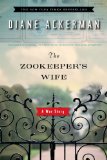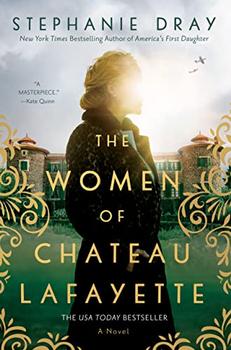Summary | Excerpt | Reading Guide | Reviews | Beyond the book | Read-Alikes | Genres & Themes | Author Bio

A War Story
by Diane AckermanDiane Ackerman typically takes as her subjects some of the more beautiful, mesmerizing, and sigh-inducing things on this earth, training her poet's pen on the magic of our five senses (A Natural History of the Senses), the mysteries of the brain (An Alchemy of Mind, 2004), the majesty of her garden (Cultivating Delight, 2001), the ecstasy and transcendence of play, (Deep Play, 1999), the activates of animals (The Moon By Whale Light, 1991), and romantic love (A Natural History of Love, 1990). She is known – and much beloved – for her deeply sensuous prose, her elaborate metaphor, her contagious delight in the world around her. So Ackerman's devoted readers may find it strange that she would now choose to write about one of the ugliest, most base and cruel events in the history of humanity. How could she possibly work her trademark style? Where could she even begin to embroider such an ugly canvas? The experience of reading The Zookeeper's Wife is filled with this stylistic contradiction. Ackerman is above all a sensory writer, and whether her subject is a flock of flamingoes in the middle of Warsaw, or a blitzkrieg of bombs tearing their world apart, her senses play in the fore, undaunted by the beauty or ugliness of what they suss out.
"Every bomb creates a different scent, depending on where it hits, what it boils into aerosol and the nose detects lisping apart, as molecules mix with air and float free. Then the nose can pick up ten thousand distinctive scents, from cucumber to violin resin. When a bakery was hit, the rising dirt cloud smelled of yeast sours, eggs, molasses, and rye. The mingled odors of cloves, vinegar, and burning flesh spelled the butcher's. Charred flesh and pine meant an incendiary bomb that blasted houses with a hot, fast fire, and that the people inside had died quickly."
At first, Ackerman's writing is what draws the reader in. Her
metaphors instantly create a deep sense of place (Across the river, the
skyline of Old Town rose from the early-morning mist like sentences written in
invisible ink) and character as she describes the vibrant zoo and its
lovable keepers. When war descends her words transmit the chaos, the immediate,
haphazard nature of destruction without warning, the confusion and bewildered
acceptance of this new, uncertain and violent life. As the story of the
Zabinksis, their role in the Underground resistance, and the hundreds of Jews
they rescued unfolds, their story becomes the truly entrancing element of
Ackerman's book, with Antonia, the zookeeper's wife, at the center.
Antonia emerges as what the LA Times aptly calls "the
imaginary love child of Doctor Dolittle and Jane Goodall", a force of calming
strength, intuition, and compassion who believed deeply in cultivating whatever
small joys and play one could in the midst of such horrors. As Ackerman quotes
liberally from Antonia's diaries, the two women appear as twin souls, separated
by a generation. They each find unparalleled delight in the natural world around
them and the mysteries of the animal kingdom. As writers, both live with an
often sorrowful awareness of the metaphors and symbols that arise from even the
most terrible events, and how they resonate eerily on the page. After Gestapo
officers held a drunken hunting party on the Zabinksi's zoo grounds to shoot the
few remaining members of their animal family for sport, Antonia wondered, "How
many humans will die like this in the coming months?" and later wrote of that
foreboding evening:
"A very bright, light amaranth sunset was predicting wind for the next day… in the cold-blue evening light, sunset was playing funeral bells for our just-buried animals. We could see our two hawks and one eagle circling above the garden. When their cage was split open by bullets, they'd flown free, but they didn’t want to leave the only home they knew. Gliding down, they landed on our porch and waited for a meal of some horsemeat. Soon even they became trophies, part of the Gestapo officers' New Year's hunting party."
So many stories have been written about the Holocaust. Some recount one of the few small miracles, they give us hope for humanity, and honor those who acted with compassion. Others delve into the darkest parts of the destruction, sinking the reader deep into the trenches of the violence. But The Zookeeper’s Wife does both, which is what makes it so worth reading. Writing unflinchingly with equal vigor about the beauty and the ugliness, Diane Ackerman manages to re-sensitize the reader to acts of war and acts of grace.
![]() This review was originally published in The BookBrowse Review in October 2007, and has been updated for the
September 2008 edition.
Click here to go to this issue.
This review was originally published in The BookBrowse Review in October 2007, and has been updated for the
September 2008 edition.
Click here to go to this issue.

If you liked The Zookeeper's Wife, try these:

We Must Not Think of Ourselves
by Lauren Grodstein
Published 2024
A heart-wrenching story of love and defiance set in the Warsaw Ghetto, based on the actual archives kept by those determined to have their stories survive World War II

The Women of Chateau Lafayette
by Stephanie Dray
Published 2022
An epic saga from New York Times bestselling author Stephanie Dray based on the true story of an extraordinary castle in the heart of France and the remarkable women bound by its legacy.
If there is anything more dangerous to the life of the mind than having no independent commitment to ideas...
Click Here to find out who said this, as well as discovering other famous literary quotes!
Your guide toexceptional books
BookBrowse seeks out and recommends the best in contemporary fiction and nonfiction—books that not only engage and entertain but also deepen our understanding of ourselves and the world around us.